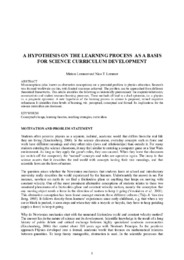A hypothesis on the learning process as a basis for science curriculum development
Abstract
Misconceptions (also known as alternative conceptions) are a perennial problem in physics education. Research
was focused worldwide on this, with limited successes achieved. The problem can be approached from different
theoretical frameworks. This article identifies the following as historically predominant: the empirist-behaviorist,
constructivist and student resource learning processes. These methods all lead to a dual epistemic, i.e. a physics
vs. a pragmatic epistemic. A new hypothesis of the learning process in science is proposed, termed cognitive
refinement. It identifies three levels of learning, viz. perceptual, conceptual and formal. Its implications for the
science curriculum are discussed.
